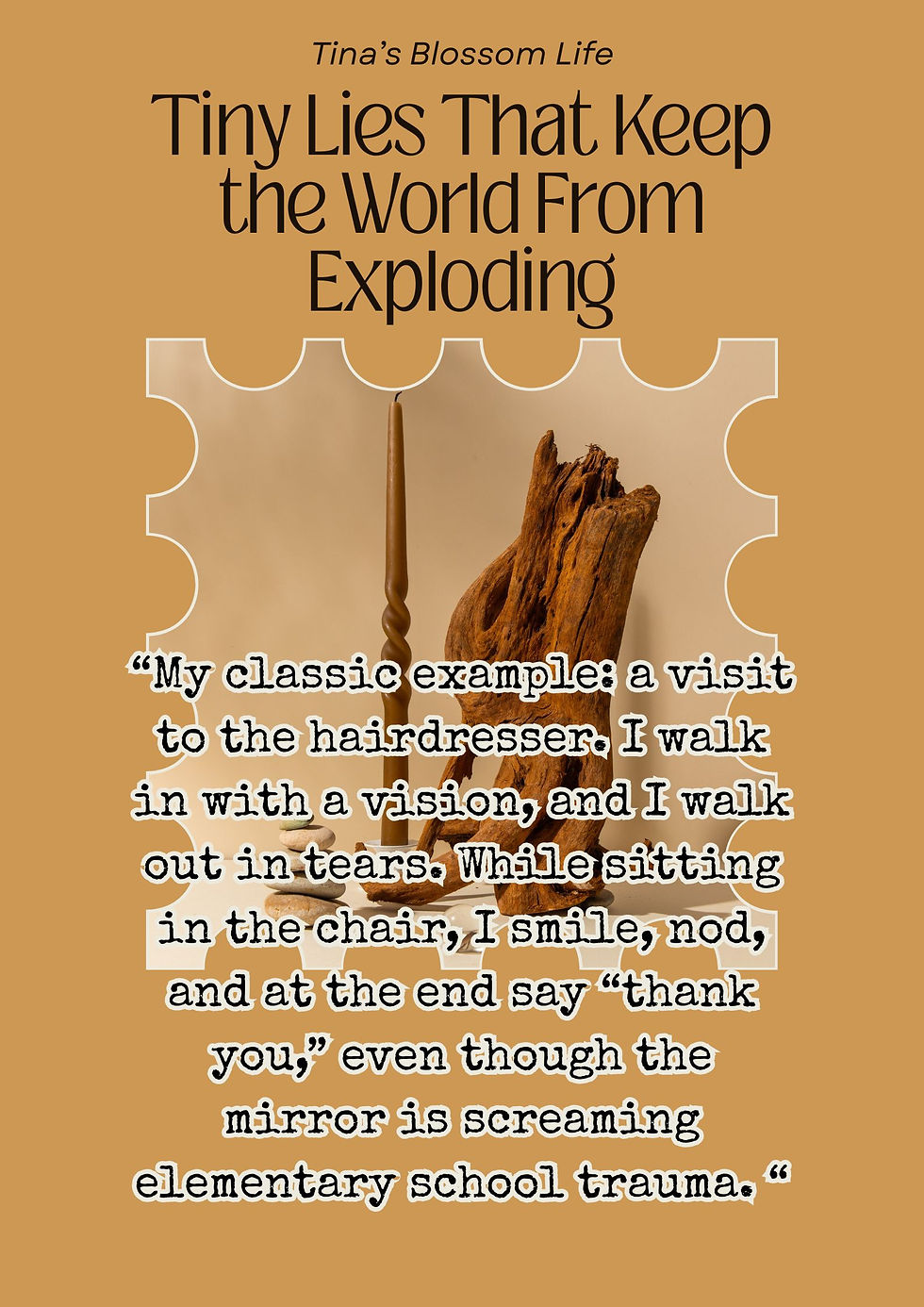Tiny Lies That Keep the World From Exploding (and My Hair From Crying)
- Tina's Blossom Life

- Aug 6
- 4 min read

Today’s topic is small lies. Not the kind that break up marriages, topple empires, or end celebrity careers. I’m talking about those little, everyday “truth adjustments” we use to avoid awkwardness, misunderstandings, or simply because… it’s easier.
My classic example: a visit to the hairdresser. I walk in with a vision, and I walk out in tears. While sitting in the chair, I smile, nod, and at the end say “thank you,” even though the mirror is screaming elementary school trauma. The hairdresser asks, “Do you like it?” and I, with an inner scream, answer: “Super! Exactly what I wanted!” Back home, I rush to the bathroom – and this isn’t just entering a bathroom, this is a full-on hair-rescue mission with scissors in hand. The mirror confirms my downfall: zero assertiveness. Is it a lie? Yes. I’m even lying to myself. But that beautiful woman who’s been on her feet in the salon for twelve hours is probably exhausted, and I just don’t want to hurt her feelings. That’s why, for about five years now, I’ve been coloring and cutting my own hair. I have to admit, after watching a hundred YouTube tutorials, surviving three disasters and two nervous breakdowns, I’ve reached perfection. And honestly, I’m happy with my work on my own head.
Small lies are often the daily currency of relationships. Someone offers you something homemade, and you know this person has a… complicated relationship with personal hygiene. You also know their kitchen looks worse than a recycling center in Birmingham. It’s hard to refuse, and the “I’m on a diet” excuse might not work, so you smile, say “thank you,” and wrap it up in a napkin “for later.”
Gifts. Oh, gifts. The eternal problem of the recipient. You open a package and find something that looks like a bowl, a vase… or a bowl-vase. It’s somewhere between an IKEA lamp that fell out of a 2004 catalog and a hospital bedpan. “Wow! Auntie, thank you! That’s exactly what I needed!” you say, even though you know it’s going straight to the “for later” shelf (translation: forever). Fortunately – or unfortunately – we live in times when everyone has everything, and if they don’t, a quick Amazon search and next-day delivery solves it.
Small lies told in good faith are like a band-aid for a small cut – they don’t fix everything, but they prevent the bleeding. The problem for me is that the line between “for the sake of the situation” and “because I can’t be assertive” is as thin as a hair in soup (which, of course, I wouldn’t mention to the waiter).
There are also strategic lies. For example, when you’re planning a surprise. “Where have you been?” someone asks. “Oh, just for a walk,” you say, while your bag is full of balloons, cake, and confetti for someone’s birthday. Is it a lie? Technically, yes. But is that little spy mission for someone’s smile a bad thing? A lie worth the future surprise.
Of course, it doesn’t always go as planned. Often, if we can’t set boundaries, small lies can snowball into slightly bigger ones. Better not go down that road. I always say lies have short legs – they always catch up with you.
Over time, I started to wonder – are these little lies a way to live in harmony, or just a quiet erosion of honesty? My theory is: if the lie doesn’t hurt, and protects someone’s feelings or preserves the element of surprise, it’s in the “allowed” zone. But if it becomes an excuse to avoid difficult conversations (see: hairdresser, life-changing dish, mystery-shaped gift), we’re stepping on thin ice.
Maybe the problem isn’t the lies themselves, but that many of us don’t have the tools to tell the truth gently. Tell the hairdresser: “It’s a bit shorter than I expected, but let’s see how it settles” instead of “Super!”. If someone offers you something to eat, you could say: “That’s very kind of you, but I have to pass” (which, in diplomatic language, means “Never again”). With gifts? Focus on the intention: “Thank you for thinking of me” – no need to promise the bowl-vase will be the star of your living room.
Still, I think these little lies are like grease in the machine. Without them, everyday life would creak like an old door. But maybe sometimes it’s worth checking if, instead of lying, we can just… say something neutral and polite. Explain it subtly.
Because if one day someone asks me, “Do you like this dessert?” and I answer, “No, it tastes like a sweet version of tomato sauce,” that might be the beginning of the end of certain relationships. And yet – maybe sometimes it’s worth it? If someone can’t understand that we’re all different and that dessert might taste amazing to one person and awful to another.
Question for you: are these little lies truly a sin, or just a human way of keeping the world turning a little more smoothly?




Comments